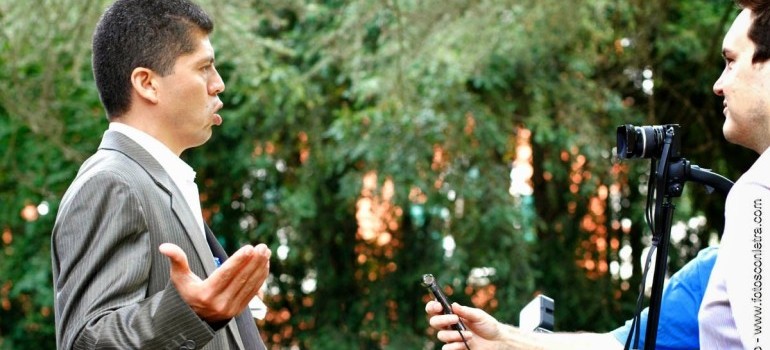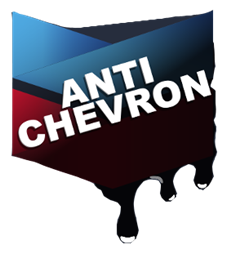
A delegation from the Union of People affected by the activities of the oil company Chevron Texaco in Ecuador (UDAPT) participated in the 29th session of the Human Rights Council with the support of the CETIM to denounce the merciless campaign that the transnational corporation is waging with the aim of criminalizing its victims and silencing their defenders.
The Chevron case refers to the 22 years of litigation by indigenous and peasant communities in Ecuador against the transnational corporation Chevron to demand justice and compensation for the damage caused by 26 years of oil drilling in the Amazon region of Ecuador.

Chevron has polluted more than 450,000 hectares of one of the richest areas of biodiversity on the planet, destroying the lives and livelihood of its inhabitants, causing the death of hundreds of people and a sharp increase in the rate of cancer and other serious health problems. More than 60 billion litres of toxic water were dumped into the rivers and streams, 880 hydrocarbon waste pits were dug, and 6.65 billion cubic meters of natural gas were burned in the open air.
“this pollution is not the result of an accident”
“The worst thing is that this pollution is not the result of an accident but the deliberate use of obsolete polluting technologies in order to save money,” said Maria Eugenia Garces, representative of the UDAPT, during the side event “Chevron vs. the people of Ecuador: how a large transnational corporation is trying to criminalize the victims and silence defenders” organized by the CETIM on June 16 at the Palais des Nations in Geneva.
“This example shows that it is not only the states that violate human rights, but companies do it as well, through systematic and widespread practices that deny the fundamental rights of their workers and the societies in which they establish themselves,” insisted Eduardo Toledo, lawyer for the victims before the International Criminal Court (ICC), during the said conference.
Despite the judgments of Ecuadorian courts which have ordered Chevron to pay $9.5 billion for causing the worst environmental disaster in the history of humanity, the oil company denies liability, and devotes considerable effort and resources to avoiding the sentence, persecuting the victims and silencing those who support them. Chevron’s chief lawyer said publicly in May 2009 that the company “would fight until hell freezes over and then continue to fight on the ice.”
The delegation presented an oral statement at the plenary session of the Human Rights Council to denounce the media, legal, economic and scientific campaign being waged by Chevron against the affected population and their defenders for seven consecutive years to ensure its impunity and to avoid the application of the legal decision.
“Chevron has employed 60 legal firms and 2000 lawyers, public relations agencies and lobbyists to put in place their strategy that consists principally in intimidation and terror in order to silence anyone who risks raising their voice in favour of those communities affected” explained Maria Eugenia Garces.
The delegation has presented cases of intimidation, of persecution and of criminal proceedings against the affected populations, journalists, collaborators, lawyers, activists, independent citizens and even investors who ask that the oil company deal responsibly with this case.
Maria Eugenia Garces emphasised that “the violations of human rights are not possible except when they take place in the dark and remain in the dark. Silencing victims so that no-one knows of their existence is one of the ways to avoid public condemnation and being held responsible for actions against them.”
” present the victims as criminals”
Eduardo Toledo has highlighted “a legal campaign in the United States, and in other countries where the plaintiffs have appealed, to make the Ecuadorian judgement appear as a fraud and to present the victims as criminals and the oil company as innocent, with the sole aim of delaying the result which will arrive sooner or later: reparation for the damage caused in the Ecuadorian territories.”
In February 2011, Chevron lodged a complaint before a New York court accusing the Ecuadorian plaintiffs and their supporters of extortion. According to the judgement, the decision of the Ecuadorian courts was fraudulent and any publicity campaign, the creation of Web pages, of blogs and the demands addressed to government authorities by NGOs could be considered as an attempt at criminal extortion. This was appealed on 2nd July 2014 but this judgment had already had catastrophic consequences for the victims and their supporters, by criminalising them, depriving them of financial support, and throwing suspicion on their integrity and their credibility.
In the face of this evidence of violations of human rights committed by Chevron, an urgent intervention by the Human Rights Council and by its special procedures was solicited in order to bring to an end these attacks on victims and their defenders, and to respect the judgement of the Ecuadorian courts.
For more information on this case, see the written statements presented on this case by the CETIM to the Human Rights Council in June 2014 (here) and in June 2015 (here).